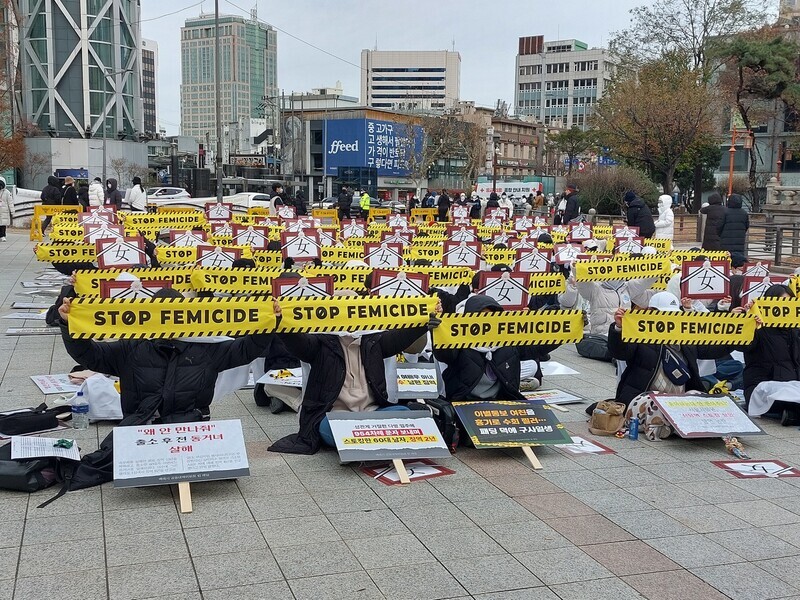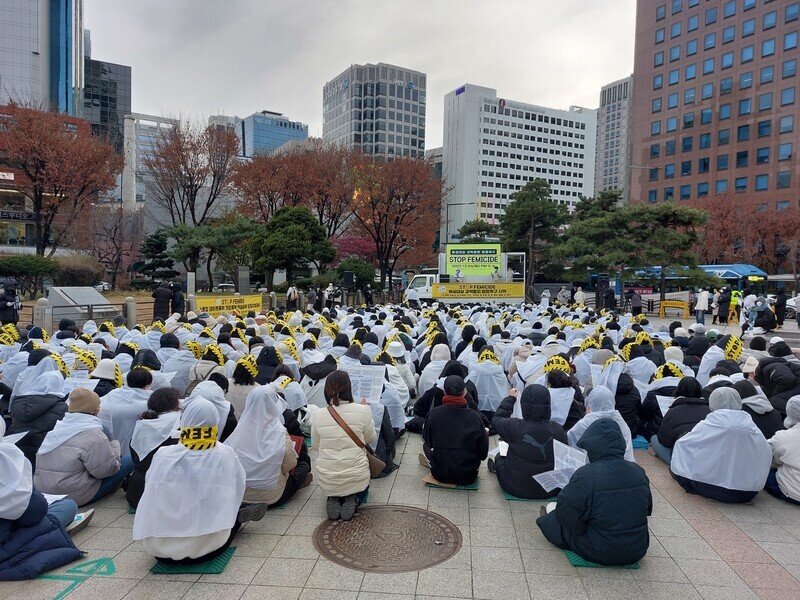hankyoreh
Links to other country sites 다른 나라 사이트 링크
Korean women take to streets to protest lax response to “structural” femicides

Around 500 people gathered in front of the Bosingak belfry in Seoul’s Jongno District on Sunday afternoon for a rally to call for stronger punishment of violent crimes against women.
Despite frigid temperatures with a wind chill factor of 5 degrees below zero, they were out to make their voices heard through the rally.
“Femicide is a structural issue that must not be treated as a personal one,” participants shouted.
“The real perpetrators of femicide are social structures.”
“We don’t want to live in fear. We want to feel safe.”
The rally on Sunday was organized by the group Haeil. Similar rallies to call for strict punishment of violent crimes against women were held in other cities besides Seoul, including Gwangju and Busan. According to the organizers’ estimates, around 600 people assembled in the three cities.
As 2022 draws to a close, ordinary people took to the streets in subzero temperatures to demand that the state create a society where women are safe.
In calling on the legislative, executive, and judiciary branches to solve the problem of violent crime against women, Haeil mentioned a number of cases, including a July incident involving the sexual assault and murder of an Inha University student, the September murder of an employee by a stalker at Sindang Station, and an October incident in Seosan, South Chungcheong Province, in which a domestic abuser violated a restraining order to go to his victim’s workplace and kill her there.

According to crime figures from the National Police Agency, a total of 123,810 violent crimes (including homicides, assaults, arson, rapes, and incident assaults) were reported in the five years from 2017 to 2021. Women were the victims in 109,133 of those cases, or 88.1%.
“Why did nothing [about women’s safety] change after the 2016 murder at Gangnam Station?” asked Haeil co-founder Kim Ju-hee. “Why do people have to die before [society] goes through the motions of change, and why do [calls for change] fade away as time passes?”
“We need to keep pushing back against who authorities to try to turn this into a personal issue, denying the violence and discrimination that women experience every day and telling us that we’re being ‘oversensitive,’” she continued.
Signs in the rally participants’ hands showed the Chinese character for “female” (女), with the image of a chrysanthemum and mourning sashes at the top — sending the message that the victims had “died because they are women.” Participants also held up yellow cloths with the words “Stop femicide” written in English.
Using hot packs to thaw their hands and ears, participants withstood the cold as they chanted phrases including, “We can’t take it anymore,” “Protect women,” “We want to live,” “Guarantee our right to survive,” and “The administration needs to reflect on laws and systems that are riddled with loopholes.”
During the rally Sunday, a statement was read on behalf of a woman in her 20s who was assaulted by a stranger in his 30s last May in the Seomyeon area of Busan’s Busanjin District. The man in question was sentenced to 12 years in prison last October on the charge of attempted homicide.
“Calling attention to femicide means establishing proper measures to prevent similar incidents and staying with the survivors of victimization,” the victim’s statement said.
“Femicide is a matter that can only be stopped when there is a change in attitudes by the people in charge of investigative organizations, the judiciary, and the administration,” she also said.
Participants in the rally also shared their own messages. One participant, who said she had been the victim of stalking, stressed that “this needs to be a society where the perpetrators go to prison and the victims are supported in returning to daily life.”
Another woman in her 20s said, “I’ve been taking part regularly in rallies and demonstrations with a sense of guilt as a survivor.”
“But why should we feel guilty? The fault lies with our world,” she continued.
The group Haeil expressed its “hope that resistance against femicide will spread far and wide.”
By Oh Se-jin, staff reporter
Please direct questions or comments to [english@hani.co.kr]

Editorial・opinion
![[Column] Has Korea, too, crossed the Rubicon on China? [Column] Has Korea, too, crossed the Rubicon on China?](https://flexible.img.hani.co.kr/flexible/normal/500/300/imgdb/original/2024/0419/9317135153409185.jpg) [Column] Has Korea, too, crossed the Rubicon on China?
[Column] Has Korea, too, crossed the Rubicon on China?![[Correspondent’s column] In Japan’s alliance with US, echoes of its past alliances with UK [Correspondent’s column] In Japan’s alliance with US, echoes of its past alliances with UK](https://flexible.img.hani.co.kr/flexible/normal/500/300/imgdb/original/2024/0419/2317135166563519.jpg) [Correspondent’s column] In Japan’s alliance with US, echoes of its past alliances with UK
[Correspondent’s column] In Japan’s alliance with US, echoes of its past alliances with UK- [Editorial] Does Yoon think the Korean public is wrong?
- [Editorial] As it bolsters its alliance with US, Japan must be accountable for past
- [Guest essay] Amending the Constitution is Yoon’s key to leaving office in public’s good graces
- [Editorial] 10 years on, lessons of Sewol tragedy must never be forgotten
- [Column] A death blow to Korea’s prosecutor politics
- [Correspondent’s column] The US and the end of Japanese pacifism
- [Guest essay] How Korea turned its trainee doctors into monsters
- [Guest essay] As someone who helped forge Seoul-Moscow ties, their status today troubles me
Most viewed articles
- 1[Column] The clock is ticking for Korea’s first lady
- 2Hong Se-hwa, voice for tolerance whose memoir of exile touched a chord, dies at 76
- 3After 2 months of delayed, denied medical care, Koreans worry worst may be yet to come
- 4[Column] Has Korea, too, crossed the Rubicon on China?
- 5US overtakes China as Korea’s top export market, prompting trade sanction jitters
- 6Samsung barricades office as unionized workers strike for better conditions
- 7[Correspondent’s column] In Japan’s alliance with US, echoes of its past alliances with UK
- 8All eyes on Xiaomi after it pulls off EV that Apple couldn’t
- 9[Correspondent’s column] The US and the end of Japanese pacifism
- 10[Guest essay] How Korea turned its trainee doctors into monsters